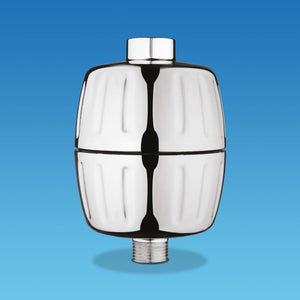If you’ve ever paused mid-dry to wonder, “Why do my feet itch after a shower?” you’re not alone. That prickly sensation often stems from a perfect storm of hot water, mineral-heavy hard water, harsh body wash, and sometimes underlying skin conditions—factors that strip natural oils and leave already sensitive soles begging for relief.
When a hot shower spikes body temperature, blood vessels dilate, histamine is released, and itchy skin can flare up almost instantly. Add hard-water minerals or chlorine that settle on the surface like grit, and the skin’s protective barrier weakens, making dry skin, tingling, or even an itchy rash more likely the moment you step onto the bath mat.
Pinpointing which trigger is responsible for your post-shower discomfort is the first step toward stopping the scratch cycle—whether that means swapping soaps, dialing back the water temperature, moisturizing smarter, or installing a filter that lets your feet stay clean without compromising their natural moisture.
What Causes Itchy Feet After a Shower?

Itchy feet after a shower can be triggered by a variety of skin issues and external factors. Here’s a closer look at what might be causing that irritating sensation.
1. Xerosis Cutis
One of the most common causes of itchy feet post-shower is xerosis cutis, the medical term for extremely dry skin. When your skin loses too much moisture, it becomes dehydrated and prone to itching, cracking, and irritation.
Hot showers, in particular, can strip the skin of its natural oils, leaving your feet feeling tight, flaky, or even cracked. If you frequently notice itchy skin after bathing, especially on your feet, xerosis cutis could be the culprit. Dry climates and improper moisturizing habits often make the condition worse.
2. Use of Harsh Soaps and Shower Products
Many body wash products and soaps contain fragrances, sulfates, and alcohol-based ingredients that can strip natural protective oils from the skin. When the skin barrier is compromised, it becomes more sensitive, resulting in that annoying itchy sensation.
Those with sensitive skin are especially vulnerable to the drying effects of harsh soaps, and continued exposure can worsen the problem. Switching to skin care products labeled “fragrance-free” or “for sensitive skin” may help reduce irritation and keep the skin moisturized.
3. Hard Water Irritation
If your home has hard water—water with high levels of calcium, magnesium, and other minerals—it can aggravate skin problems. These minerals don’t rinse away easily and can leave behind residue that causes itching and dry skin.
Over time, hard water can strip the skin of essential moisture and damage the protective barrier, leading to itchy or irritated skin, especially after showering. If you’re noticing more itchy feet or dry patches, your water quality might be part of the problem.
4. Chlorine and Other Chemicals in Shower Water
Tap water is often treated with chlorine and other chemicals to kill bacteria. While safe to drink, chlorine can have a drying effect on the skin. For some, repeated exposure during hot showers can cause itchy skin, especially on the more delicate areas like the feet.
These chemicals may also interact with other products, increasing irritation or triggering allergic reactions. Reducing your exposure to chlorine—especially during hot baths or long showers—may help minimize this issue.
5. Allergic Reactions to Bathing Products
If you’ve recently changed your body wash, soap, or even your laundry detergent and are experiencing new itching or a mild itchy rash, an allergy might be the reason. Ingredients like artificial dyes, parabens, or specific botanical extracts can cause skin irritation or allergic reactions.
Keep an eye out for other symptoms, such as redness, swelling, or burning sensations on your feet. These are signs that your skin may not be tolerating the products you’re using.
6. Fungal Infections
Another common but often overlooked reason your feet itch after a shower is a fungal infection, such as athlete’s foot. The warm, damp environment of showers provides ideal conditions for fungus to thrive, especially in communal or shared shower spaces.
Fungal infections may present with peeling, redness, or a burning sensation alongside itching. If the symptoms persist or worsen, a visit to your doctor may be necessary for accurate diagnosis and treatment.
7. Aquagenic Pruritus
In rare cases, aquagenic pruritus may be to blame. This rare condition causes intense itching upon contact with water despite no visible rash. Though the exact cause is unclear, it may be linked to how the nervous system reacts to water and temperature changes.
Those with aquagenic pruritus often report severe itching lasting from minutes to hours after showering or bathing. If this sounds familiar and typical remedies don’t work, it’s worth discussing this health condition with a healthcare provider.
How to Prevent Itchy Feet After a Shower
If you’re tired of scratching your feet after every shower, here are some practical ways to prevent that itchy discomfort from coming back.
Gently Pat Your Skin Dry
Instead of vigorously rubbing your feet with a towel, gently pat them dry. Rubbing can irritate the skin, especially when it’s already sensitive. Patting helps retain moisture, which is crucial for keeping the skin moisturized.
Apply Moisturizer While Skin Is Damp
Right after showering, your skin is more receptive to hydration. Applying a thick, unscented moisturizer while your feet are still slightly damp locks in that moisture and helps restore the natural oils that were stripped away during the shower.
Look for products with ingredients like glycerin, ceramides, or shea butter to combat dry skin effectively.
Change to a Milder Soap
Switch to a body wash or bar soap designed for sensitive skin. Avoid products labeled with “antibacterial” or “deep-cleaning,” as they often contain chemicals that dry out the skin.
Even some “natural” soaps contain essential oils or botanical extracts that can act as allergens, so always check the label and do a patch test if you’re trying something new.
Modify Your Showering Habits
Long, hot showers may feel relaxing, but they’re not doing your skin any favors. Try to keep your shower time to under 10 minutes and lower the water temperature to lukewarm.
This simple adjustment helps maintain your skin’s natural protective oils and reduces post-shower dryness.
Use a Cooling Product After Showering
Products containing aloe vera, chamomile, or cooling gels can offer immediate relief from itchy skin. Be sure to avoid those with alcohol or artificial fragrance, which may worsen irritation.
Some people find relief using calamine lotion, which helps soothe an itchy rash or mild skin irritation after bathing.
Use Creams Specifically for Itch Relief
Topical creams with ingredients like menthol, camphor, or colloidal oatmeal can help relieve itching. These are widely available and can provide fast-acting comfort without a prescription.
If you’re experiencing severe itching, however, it may be time to speak with a doctor for stronger or prescription-based treatment options.
Explore Using Essential Oils
Natural remedies like diluted tea tree oil or peppermint oil may help reduce itching, especially if the root cause is a mild fungal infection or dry skin. Always dilute essential oils with a carrier oil like baby oil, and perform a patch test before applying broadly.
Increase Your Water Intake
Drinking more water helps hydrate your skin from the inside out. While not a cure-all, maintaining hydration is a foundational step in preventing dry skin and keeping your body healthy, especially in dry climates.
Can a Shower Filter Help Prevent Itchy Feet After a Shower?

Yes—installing a shower filter can make a significant difference if you’re dealing with itchy skin, especially after hot showers. Many shower filters are designed to reduce chlorine, heavy metals, and hard minerals in tap water that can strip the skin of its natural oils.
AquaBliss offers advanced shower filters that target exactly these irritants, helping restore comfort to your daily routine. With a simple installation, you can enjoy cleaner, softer water that supports healthy skin and reduces post-shower discomfort.
Explore AquaBliss Shower Filters here: AquaBliss Shower Filter Collection
Simple Fixes for a Common Irritation
If you’re wondering, “Why do my feet itch after a shower?”—you now have a clearer picture. Several factors can be to blame, from hot water and harsh soaps to more complex skin conditions like aquagenic pruritus or cholinergic urticaria.
Here’s a quick summary to help you troubleshoot:
- Dry skin (xerosis cutis) from hot showers or low humidity can cause itchiness.
- Body wash and soap with strong chemicals strip your skin’s natural defenses.
- Hard water and chlorine exacerbate irritation and dryness.
- Fungal infections can worsen in moist environments like showers.
- Allergic reactions and rare health conditions like aquagenic urticaria or cholinergic urticaria may cause severe or unexplained itching.
Simple steps—like changing your shower routine, using an unscented moisturizer, or installing a quality shower filter from AquaBliss—can help bring long-lasting relief. Still dealing with severe itching or unsure of the cause?
It’s best to consult a healthcare professional to rule out underlying medical conditions or develop a personalized treatment plan. Ready to improve your shower experience? Discover how AquaBliss can help you protect your skin, reduce itchiness, and feel better after every wash. Browse our Shower Filter Solutions
** Disclaimer: This article is for informational purposes only and does not constitute medical advice. Please consult a licensed healthcare provider for professional diagnosis and treatment of any skin or health-related issues.







